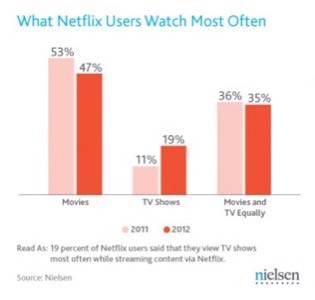No longer a DVD-by-mail movie rental service, Netflix has evolved into something much bigger. Viewers are turning to Netflix to watch TV, according to new data from Nielsen, and the service is poised to become a powerhouse production studio.

Nineteen percent of users say they primarily watch television shows on Netflix. That may not sound like a lot, but it’s a trend line that’s moving upward, having increased by 8% in the past year.
Netflix’s TV audience is growing just as the company joins YouTube and Hulu in offering original, Web-first programming whose quality rivals that of broadcast sources. Netlix is producing originals like “Lillyhammer.” Hulu kicked off 2012 by announcing a $500 million investment in original programming, and the online outlet has been making good on its promise to roll out new shows throughout the year. Such Web-native fare has yet to enthrall viewers in the way that TV shows like “Game of Thrones” and “Breaking Bad” have, but original TV-style online programming is a young art form.
If anything will test the staying power of this emerging medium, it’s the return of “Arrested Development.” The cult television hit, which originally aired on Fox before being canceled in 2005, will begin a new season exclusively on Netflix next year.
As companies like Hulu and Netflix enlist top industry talent to create shows, the line between cable and Internet TV slowly blurs. Last week, Hulu announced that one of its original productions, “Spoilers With Kevin Smith,” will land on a Canadian cable channel, marking the first time one of the company’s Web-first programs has made the leap to traditional TV.

Another win for Web-based television came last week when a U.S. District Court judge ruled in favor of Aereo, a startup that pushes broadcast TV to smartphones and tablets. The decision dashed the hopes of broadcast networks and cable channels counting on copyright infringement claims to put an end to the company.
Aereo lives on for now, but the startup faces lengthy legal deliberations that will ultimately determine its fate. With or without the controversial service, Web TV is clearly evolving into a viable alternative to traditional television.

















